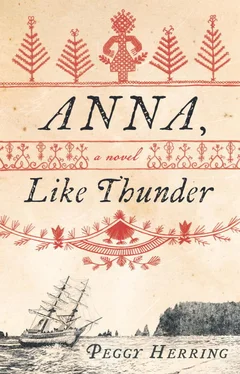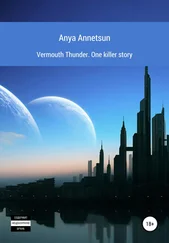We finally lose the last anchor. Whatever noise the severed cable makes when it gives way is consumed by the sound of the surf; I feel the loss immediately as the brig pivots like a dancer unleashed from the grip of her partner.
This breeze is the only thing that can save us now, this inconsequential and capricious breeze blowing from the southwest—that and the skill of my husband. Nikolai Isaakovich orders the sagging sails hoisted. Again, he leans into the wheel and spins it all the way to one side. Stout Kotelnikov thrusts a flickering lantern as far out over the bow as he can stretch, but his reach is inadequate. As the sky brightens in the east behind the black trees, the light his lantern casts is faint, too diffuse.
“Can’t you hold it farther out?” says Yakov. “The navigator can’t see.”
He presses himself tighter against the bulwark until his round body bulges against the wood. Eventually, his lantern lines up with those of Yakov and the American, and I can’t help but feel glad to see Orion’s belt mirrored here on the brig. Maybe we’re going to make it.
The sails flutter in the light wind. There’s a hopeful rattle from the rigging.
“This passage is so narrow,” declares Timofei Osipovich, “no navigator but ours would dare to attempt to find a path through it in the light of day, let alone now.”
For once, there is nothing in his words for me to disagree with.
We pass rock and shoal and rock and reef again. With each wave that breaks, I’m buoyed. I wait for the thud, the splinter, the crunch—but they don’t come. We’re moving into water that’s increasingly deeper. My husband sends the apprentice for the leadline. “I want to know how deep it is before we extinguish the lanterns,” he says. He’s beaming—he knows we’re safe.
Behind the wheel, he stands tall and navigates through what may be the trickiest passage of his career, the most awkward, with the greatest stakes. Dear Nikolai Isaakovich, you’re proving your worth to the company. How I wish Chief Manager Baranov were here to witness your astonishing skill! I squeeze Zhuchka until she coughs and squirms.
But then, the sea and the wind are nothing if not unpredictable. I’m a fool to forget this.
With a groan and a crack, the foreyard breaks.
Twenty-two sets of eyes roll up, drawn to the noise. A length of the yardarm falls and swings, attached only by shards of wood. The once-billowing foresail collapses and flutters uselessly.
Sobachnikov, the main rigger, dashes to the base of the mast and, like a spider, begins to pull himself up.
“Stop! Wait!” cries Timofei Osipovich. “There’s nothing you can do now. We have no spare.”
The brig was to have dropped anchor several days ago so the crew could go ashore to replenish our supplies. The barrels of fresh water needed topping up. The promyshlenniki were to take Zhuchka hunting for ducks or, if they were lucky, a deer. Nikolai Isaakovich also wanted them to cut a few timbers that could be used to repair or replace the masts and yards if they should break. The weather prevented us from getting close to shore that day. The next day, there was no acceptable place to anchor. I don’t remember what happened the third day. The water barrels were low, but the situation wasn’t desperate. Then the brig was becalmed.
“But—” cries John Williams. “You can’t tack against this without the foresail!”
“Our fate is sealed,” Timofei Osipovich declares. For once, there’s no mockery in his tone.
The crew tries valiantly. They manipulate the sails as best they can under the direction of my husband, with Timofei Osipovich offering assurances and advice. Even I, knowing nothing of sailing, can see the futility. Without the foresail, we can only head in one direction. For a long time and a short time, the surf pushes us toward the shore.
Mid-morning, a swell lifts the brig—the most powerful swell to hit us all morning. We rise, rise, rise—and pause. The brig teeters. My husband freezes, his hands clutched to the wheel. Old Yakov removes his cap and blesses himself. Then, with a whoosh , the water recedes. We fall gently. The hull grinds into the sand. The brig stops. We meet our fate.
It’s not noisy. It’s not dramatic. It is merely the end of our voyage.
Zhuchka gives a joyful yap, happy perhaps that we’re finally not moving.
But her joy is short-lived. The surf, finished its inhalation, now exhales. The waves strike us broadside. The brig tilts. Seawater sprays the deck. I flinch when it hits me. Then the water rushes out and the brig levels. A moment later, the waves crash against us again. Our vessel groans. How I wish the force were strong enough to dislodge us from this sandy perch and carry us back out to sea. But we have no such luck.
Then the ship is struck by two terrible waves in succession. There’s no lull, no time to catch my breath. The brig tilts to shore at such a precarious angle that I’m certain we’ll capsize. I press my body against the foremast and hold with all my strength. The ship tilts to the other side when the water recedes. Poor Yakov slips on the wet deck and falls. His cap goes flying. His body slides until it hits the bulwark. Sobachnikov rushes over, helps him up and hands him his cap.
Nikolai Isaakovich should give orders, but latched to the wheel he’s like a sleepwalker—his eyes open and staring but vacant.
“Navigator!” Timofei Osipovich cries.
His one word forces Nikolai Isaakovich from his stupor. He surveys the questioning faces on deck and shakes his head like he’s coming out of his dream. His confusion slips away, replaced with an authority he must have learned in the naval academy.
He calls on the ship’s carpenter, Ivan Kurmachev. “Is there water in the hold?” Kurmachev scurries below deck as fast as he can, given his age. His footsteps bang down the ladder.
Then he addresses Timofei Osipovich. “Where in the name of heaven are we?”
“We’re north of Destruction Island,” he replies.
“I know that,” my husband says, exasperated. “Does this place have a name?”
Timofei Osipovich shakes his head slowly. “It might. You could check your charts.”
Just then, Kurmachev comes clattering up the ladder. “Commander! She’s filling!” he shouts hoarsely and pants.
“How much time do we have?”
“Not long.”
“Then we have no choice. We must abandon ship,” my husband says. He leans in and renews his grip on the wheel, contrary to what he’s just said. The members of the crew are equally insensible. They continue to cling to the bulwark, the masts, or whatever holds them steady. The waves continue to wash in and out.
“Abandon ship!” he insists. Again, no one moves.
Timofei Osipovich intercedes. “First, the arms and the ammunition,” he orders. “Keep the powder dry.”
“We can’t take the skiff out in this surf,” says the apprentice Kotelnikov.
Timofei Osipovich gives him a withering look before he issues orders. “Kozma Ovchinnikov, John Williams—and Yakov—and the rest of the Aleuts—you’ll carry as much as you can manage.” He tells them to jump overboard, run to shore and drop their loads, and, as soon as possible, return to the ship where the remaining crew members will have their next load ready.
“Now, on my mark,” Timofei Osipovich advises. Another fierce wave breaks against the brig, and she tilts alarmingly toward shore. When the waves reach their furthest point up the sand, they turn around and start back toward us. The instant the ship starts to swing back, Timofei Osipovich shouts, “Now!”
The crew jumps, arms loaded and held well above their heads. Zhuchka can’t help it. She flings herself into the sea right behind them.
Читать дальше












